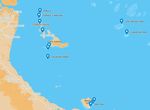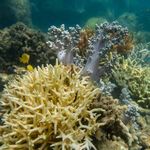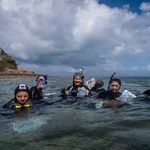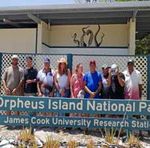Integrated Coral Reef Citizen Science Program - Project Update April 2020 - Reef Ecologic
←
→
Page content transcription
If your browser does not render page correctly, please read the page content below
Integrated Coral Reef
Citizen Science Program
Project Update
April 2020
The Reef Ecologic Integrated Coral Reef Citizen Science Program is funded by the partnership between the Australian Government’s
Reef Trust and the Great Barrier Reef Foundation.Introduction
Since April 2019 Reef Ecologic has been working with project partners, Reef
Check Australia (RCA) and Great Barrier Reef Legacy (GBR Legacy), the Great
Barrier Reef Marine Park Authority (GBRMPA) and CoralWatch to deliver
the Integrated Coral Reef Citizen Science Program.
The project has been designed to collaborate with existing citizen science
organisations utilising complementary reef monitoring projects (Eye on
the Reef, Reef Check, CoralWatch) to expand our knowledge and share
information regarding the health of the reef in the Townsville region
including Magnetic and Palm Islands.
Achievements
Over the initial 12 months of the project volunteers and staff have surveyed 22
sites at 13 locations throughout the region. 109 volunteers (of which over
47% of participants have been under 25 years of age) have participated
in multiple activities providing over 1000 hours of time to develop, grow
and contribute to citizen science. We have worked with the community
and project partners to collaborate in delivering 7 training events or
workshops.
Reef Ecologic is thrilled with the achievements of the first 12 months and
despite the challenges presented by COVID-19 restrictions, we are excited
about the next 12 months of the project.
18
Reef Check surveys
63
GBRMPA Reef
Health and Impact
15
Surveys
CoralWatch
surveys
TownsvilleKey Findings
• Live coral cover (LCC) was measured at 36.28% across
all sites and locations using Reef Check Australia’s point
intercept transect surveys (n=23*).
• Palm Island reefs illustrated the highest mean coral
cover (n=8) at 39.84% compared to offshore locations
(37.68%) and Magnetic Island Reefs (n=8) (31.48%).
• The highest recorded coral cover was at John Brewer
Reef with a mean LCC of 65%.
• Soft coral (12.26%) was prominent at Palm Island reefs.
• Bleaching was minimal across all sites throughout
2019.
• Incidences of coral disease were very low (recorded at
offshore and Magnetic Island reefs).
• Crown-of-Thorns starfish were observed at one
offshore location, John Brewer Reef.
• * Includes data from 5 RCA surveys collected outside this project
Mean live coral cover (LCC) %
LCC illustrating hard, soft and bleached corals recorded across 8 reefs in the Townsville region
using Reef Check Australia surveys. Offshore locations (n=2), inshore locations (n=6).
Reef Stress
Reef Ecologic observations throughout February and March 2020 highlighted substantial coral bleaching
on reefs throughout the Townsville region. Offshore reefs displayed a lower prevalence of bleaching than
inshore reefs. Quantitative surveys at offshore locations showed 14% of LCC was exhibiting signs of mild
bleaching. Much of the coral at these locations is expected to recover from this level of bleaching.
John Brewer Reef
March 2020
Magnetic Island
Feb 2020Training and Workshops
Throughout the year Reef Ecologic and partners collaborated in a number of internal and
external workshops to improve partnerships and empower the community.
Twelve participants joined the 3-day Reef Leadership Workshop at Orpheus
Island Research Station. They learned a variety of survey methods and
techniques to measure the health of the Reef. The workshop also
provided leadership development to empower community members in
their everyday lives.
In November we extended our annual reef restoration workshop to
include elements of leadership and survey training. Twenty nine people
attended the 4-day workshop and were given an introduction into a number
of reef survey methods which were put into practice during inwater training sessions.
Traditional Owners
Project partners have been working to engage and empower Traditional Owners
as part of our training and capacity building programs. In September we enabled
Yirrganydji Traditional Owner Tarquin Singleton to undertake Reef Check Australia
surveyor training. Additionally, 8 Traditional Owners engaged in leadership and survey
training at Orpheus Island in November 2019.
Reef Check Australia Training and Engagement
The Project has supported community participation in Reef Check Australia Ambassador
and Surveyor training programs in the second half of 2019. We provided funding
support for community members to undertake training in Townsville and at Orpheus
Island. Additionally, Reef Ecologic sponsored two new RCA Ambassadors who joined
the ranks and participated in a number of events in Townsville throughout the second
half of 2019 including Townsville City Council’s National Water Week.
Supporting Management
Reef Ecologic have been working closely with project partners to ensure our citizen
science programs support ongoing management. We have preferentially selected
programs, such as the Eye on the Reef, that contribute directly to data sources that
are used by the Marine Park Authority to make decisions on Reef management.
Strengthened partnerships have enabled us to support training of community
volunteers in the Eye on the Reef methods. Data has been shared with the Townsville
City Council and Dry Tropics Partnership for Healthy Waters for inclusion in regional
report cards.
Acknowledgements
This project was made possible by a network of dedicated volunteers, generous dive operators, wise advisors, innovative collaborators
and supportive funding agencies. Project activities were conducted on the traditional lands of the Wulgurukaba and Bindal People. We
acknowledge the Traditional Custodians and their connections to land, sea and community. We pay our respect to their elders past and
present and emerging. The Integrated Coral Reef Citizen Science Project is funded by the partnership between the Australian Government’s
Reef Trust and the Great Barrier Reef Foundation.
April 2020You can also read



























































